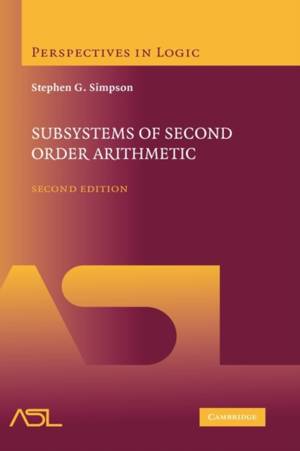
- Afhalen na 1 uur in een winkel met voorraad
- Gratis thuislevering in België vanaf € 30
- Ruim aanbod met 7 miljoen producten
- Afhalen na 1 uur in een winkel met voorraad
- Gratis thuislevering in België vanaf € 30
- Ruim aanbod met 7 miljoen producten
Zoeken
€ 90,95
+ 181 punten
Uitvoering
Omschrijving
Foundations of mathematics is the study of the most basic concepts and logical structure of mathematics, with an eye to the unity of human knowledge. Almost all of the problems studied in this book are motivated by an overriding foundational question: What are the appropriate axioms for mathematics? Through a series of case studies, these axioms are examined to prove particular theorems in core mathematical areas such as algebra, analysis, and topology, focusing on the language of second-order arithmetic, the weakest language rich enough to express and develop the bulk of mathematics. In many cases, if a mathematical theorem is proved from appropriately weak set existence axioms, then the axioms will be logically equivalent to the theorem. Furthermore, only a few specific set existence axioms arise repeatedly in this context, which in turn correspond to classical foundational programs. This is the theme of reverse mathematics, which dominates the first half of the book. The second part focuses on models of these and other subsystems of second-order arithmetic. Additional results are presented in an appendix.
Specificaties
Betrokkenen
- Auteur(s):
- Uitgeverij:
Inhoud
- Aantal bladzijden:
- 464
- Taal:
- Engels
- Reeks:
Eigenschappen
- Productcode (EAN):
- 9780521150149
- Verschijningsdatum:
- 18/02/2010
- Uitvoering:
- Paperback
- Formaat:
- Trade paperback (VS)
- Afmetingen:
- 156 mm x 234 mm
- Gewicht:
- 644 g

Alleen bij Standaard Boekhandel
+ 181 punten op je klantenkaart van Standaard Boekhandel
Beoordelingen
We publiceren alleen reviews die voldoen aan de voorwaarden voor reviews. Bekijk onze voorwaarden voor reviews.











